Introduction

May 13th is coming! I am here to tell you guys my view on what might be the 5 best lineups for the Runeterra Open based on a statistical and analytical study on Patch 4.4.0, the tournament Patch.
Keep in mind this article is being written on May 9th, and, until the 13th, some list quoted in this article might be refined, or even new decks may come up on players' radars. In case that happens, we'll document it here as well.
Problems with the Current Meta

Before we begin, I must warn everyone that the meta is in a very delicate position right now.
There is an archetype which is being explored with many region combinations: Tristana and the multiregion followers. This list currently has a variant with Noxus, Demacia and Bilgewater. The problem with that is that each of those decks plays entirely different from one another, but they carry less than half the deck with cards from the different regions.
We're talking less than 10 cards that differ from one list to the next, and even then, they are very different decks, and also with different strategies.
The easiest part to understand about this whole mess is that there are only a few lists that compete with these region combinations, so, this way, in a Noxus Tristana lineup, the only deck that has that same combination of regions would be Norra Gnar. So, you can already rule out that list when you're practicing against Tristana Noxus.

Another problem is the variety of region combinations with Karma Sett lists. Currently, we can play with the Piltover & Zaun variant, which is the most popular, but, competitively, the Targon variant might be the most interesting one, depending on the tournament's meta.
And that is the great point we'll be tackling in this article: After all, what is the meta for the Runeterra Open on the 13th?
The Tournament Meta

If we consider the way I have evaluated the last Runeterra Open was a success, because I reached Top 16 of that tournament with a lineup similar to the big winner, but less refined, we can apply that formula for the next Open as well.
My idea was the following: You must prepare yourself to win against the most popular deck, and, at the same time, have good matchups against at least the other popular archetypes.
Unlike other tournaments, that Open was played with closed decklists, and, though it hasn't been confirmed that the Runeterra Open on the 13th will be that way too, the deck building influences a lot when taking decisions. That is why the strategy we used in the last tournament's open rounds, of bringing the rising Aatrox list with Xolaani, worked out.
1º - The Most Popular Lineup
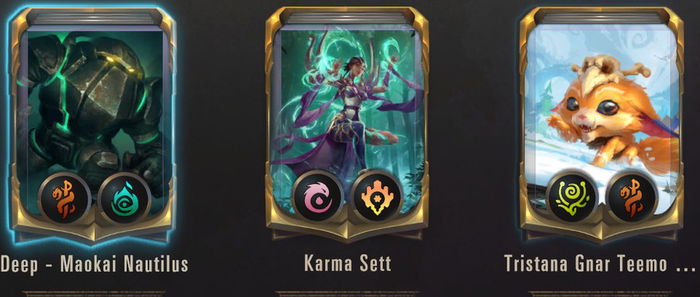
I believe that lineup is made of the three most popular decks, as they are the three lists that are best performing in the competitive scene currently. This lineup isn't the most recommended one, but it might be the one you'll face the most, for many reasons.
One of them is that, in Open Rounds, not all players there have a competitive background, and you'd be surprised to know how many go into it without even studying the meta. So, it is too easy for those players to just go on any Runeterra sites and pick the most popular decks. That happened in the last Runeterra Open, and will probably happen now.
Deep is one of the most popular lists, and has been a safe choice for players who like playing a more tempo-oriented deck, but a slower deck as well. This deck has good matchups against all Control lists in the meta, and also wins against most slower Midrange lists.
But Deep has a key difference: in some matches you just draw everything you need, go Deep on turn 5 and bam, you've won. Besides, it is also particularly fun to play.

Karma Sett is still considered unfair by many, as you practically win the game on turn 10 with Karma. We all know it is possible to win against this deck, yes, but even then, it is a list that will probably be debated a lot on Open Rounds, either as a ban target or as a deck that has many safe matchups.
In the last Runeterra Open, Karma Sett was the greatest target of the lineups brought by the 1st and 2nd place winners, and even then, we've had that list go reach Top 4. It is very possible it will show up a lot, and you must prepare yourself for that.

Tristana Gnar and Teemo with Bilgewater is currently the most popular version of the multirregion archetype, and might be the most successful list in the format.
This deck will be the greatest bogeyman in the whole tournament, and you must consider either including this lineup, or playing against it - there is no middle ground. In other words, you're forced to take this deck or neutralize it. It is the most dangerous list of all in the meta.

2º - The Most Aggressive Lineup
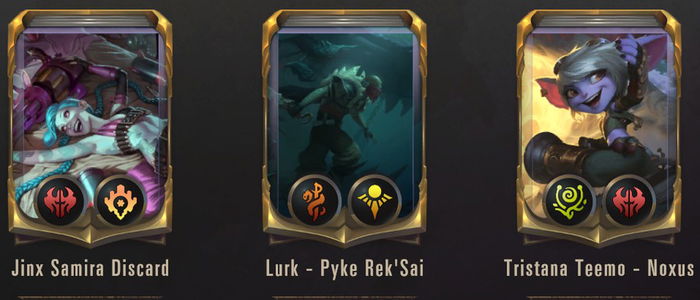
This is a popular idea that possibly many players will adopt. Considering the Aggro archetype is the most famous one among Runeterra players, it is likely this lineup becomes a problem for everybody.
Unlike other types of lineups, a completely aggressive lineup is more competitively consistent than a completely defensive lineup. That happens because Control lists are very unique and different from one another, and, this way, there are Control lists that win against certain matchups and others which don't.
In the Aggro spectrum inside archetypes, that matchup dichotomy only happens rarely, and that is why it is more common to have a whole set of Aggro decks being good against one deck in general, as they are all "too fast".
Jinx Samira is an emerging aggressive list that has been growing a lot in popularity on ranked queues. It is a deck that mixes classic Discard elements with modern cards from the latest expansion, such as Samira.
Particularly, I doubt that deck has a very long life expectancy in the competitive format using the open decklist format, but if the Open is played with closed decklists, it might surprise everyone, as this deck is very open to tuning. Otherwise, maybe the deck isn't that interesting.
A very common practice in the competitive scene is for players to slightly alter their lists to enhance their performance against certain matchups, and I believe that list goes in the group of decks that will have a relevant success on Open Rounds because of that.

Lurkers are still a relevant alternative for those who want to play aggressively. This deck never misses players' radars as it is an extremely popular list.
It is common to win games very fast after just a few turns without many issues with this list, and that is worrying for those who would like to invest in a slower strategy. Considering most decks don't have the tools to deal with the unparalleled endless development of units, you can expect this deck to surprise players in Open Rounds.

This Tristana version was the first to show up, and is the only one which has elements of direct damage to the enemy Nexus. That type of strategy is very popular and beloved by many players.
As much as this deck is probably more popular in its Bilgewater version, the Noxus version has many particular nuances that allow players who are more used to direct damage to the enemy Nexus strategies to feel more comfortable. It is a deck that has very favorable matchups, and building a lineup against that type of strategy is hard.

3º - Triple Demacia, Anti Karma and Control Decks
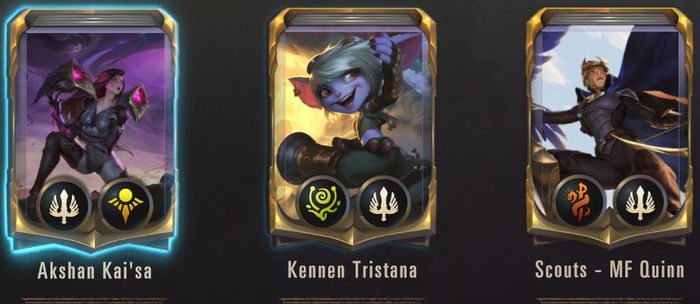
This lineup is built to be an anti-meta option, with three decks that bring Demacia, the best region for that. Other than the Tristana list, the rest of the lineup is thought to play in a Midrange way, controlling the first few turns against the opponent with Challenger units.
In case you're against Karma and other slower decks, you're still fast enough to win the game. This lineup is becoming very popular among players in the competitive Brazilian community, and is currently one of the best options to play safely against the meta.
Akshan and Kai'Sa is a very unknown list, and on paper doesn't seem good. But, in practice, it is a deck with all the resources to deal with small to medium threats on your opponent's board.
Actually, it comes in as a complement to this lineup as a third deck. The main idea with this whole lineup is to hold hostage Karma lists or Control lists your opponent might bring. So, even if you lose one match, your opponent will never win with their Karma or Control list.
Kai'Sa comes in as a third list alternative which wins against Control lists, and also has Demacia elements which, in general, are good against the rest of the meta. This list is horrible for ranked queue, and I don't recommend you use it unless you're complementing this specific lineup.

Tristana Demacia has been popularizing itself as the "toxic deck" in the community. That happened because you just need to have a board with 4 or more units on turn 6 or 7 to win automatically with Champions' Strength.
It is a very simple strategy which is very easy to execute, and no list has managed to stop that sort of play. That is why it is growing increasingly in popularity, and you can be sure it will be one of the most sought-after options for more experienced competitive players.
Kennen is a wild card here. This champion is more consistent in mirror matches, and produces a token card that can be discarded by Bandle Painter. That is without mentioning it is possible, but not very common, to level him up by playing lots of Hungry Owlcats. Kennen ends up performing the same role as Teemo, but in a slightly different way.

Scouts are back, and stronger than ever. This list always shows up and disappears out of nowhere, but then comes back to bring hell on slower players. And now that it is common to play with Champions' Strength, this deck finds itself in a great spot in the meta.
The Scout strategy of attacking multiple times per turn is greatly supported by the package of cards which remained after rotation, and Demacia is in a very favorable spot. All those factors contribute to this Scout list being a perfect idea for the Runeterra Open.

4º - Triple Mirange, Decks with many Challengers
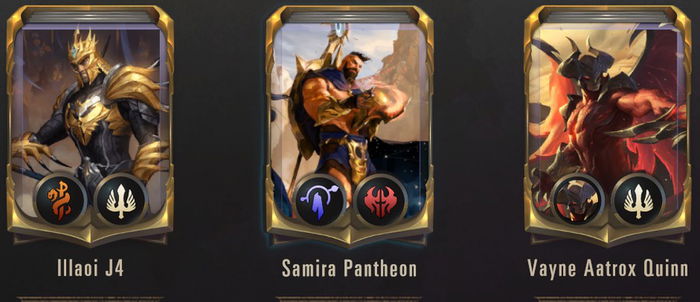
This lineup is very similar to the Triple Demacia lineup, but these decks cover different matchups, besides having more well-rounded and classic strategies in the metagame.
These are more popular decks and with more conquests: the Vayne list, for instance, was part of the winning lineup in the last Runeterra Open, and hasn't changed since then. Unlike the lineup we've seen above, Midrange decks are less focused on being pure anti-meta lists, and are more well-positioned lists in the game's competitive ecosystem.
That has two sides: it is good because it is easier to find content about those decks in case you want to study, but also, as they are more popular lists, it is easier to build good lineups to go against them.
The Illaoi list is simply unfair when the enemy doesn't have a way to deal with your dynamic early game. If you establish a board in which your Tentacles are alive, it is almost a guaranteed victory.
The strategy here is quite clear and very obvious, that is, your opponent will know exactly what you're going to do. But even though they might know it, they'll probably not be able to build a trap for you in time or answer your board.
It is not easy to play against this list, just as it is not easy to build a lineup against it, and that is why this deck might be a great option for the Runeterra Open.

Samira Pantheon is every experienced player's favorite deck currently. It is a very hard list, but a very rewarding one as well, which, when played well, is almost unbeatable. Of course that, to play this list, you need a lot of practice and dedication, but if you study properly, it will take you far.
There is a reason this is the most popular list among the greatest names in competitive play currently. So, if you see that deck on the 13th, you can be sure the one piloting it is a very dangerous person.

Vayne has also stabilized in the meta as a list that is beloved by professional players. Speaking in competitive terms, I believe it is the most well-rounded deck. That means it is a list that has a beginning, middle and end, many favorable matchups, and various win conditions.
This list has many smart plays that can be done, and they make it extremely dynamic and also fun. Those who lean towards dominating Darkins also have the tendency to be players who enjoy responsive and anti-meta lineups.
This deck was used by the winner of the last Runeterra Open, and it might show up again a lot, once it wasn't changed at all since the last tournament.

5º - Dynamic and Responsive Lineup
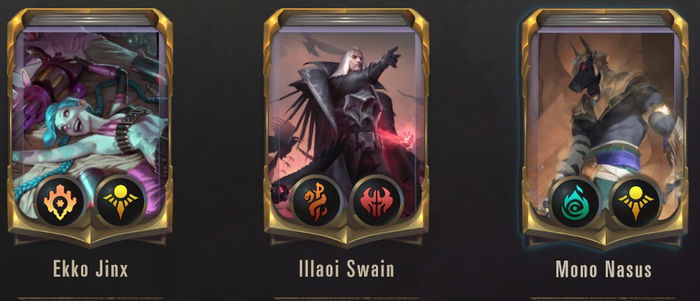
I use the term "responsive decks" instead of "Control decks", because I don't believe these lists are Control lists, exactly, even though they have many elements from that archetype.
If you stop and analyze them closely, these three have a very complete removal package, but they also have a win condition which is tied inherently to a specific combo. Even then, they still form a very strong triad of decks to play against a strategy in which your opponent brings Karma lists or Midrange decks.
Ekko Jinx is one of the lists I fear the most in this Runeterra Open. It might be one of the toughest lists to play against, and this deck is no longer considered a very difficult strategy to play.
Nowadays, due to the popularization of this deck, it is very common for players to learn how to play this list really well, and they can extract this deck's full value in each match. It also grabs the attention of more experienced players, and may check enemy lineups.
This means Ekko Jinx many times guarantees you a victory, which forces your opponent to try and bring a 2x1 score against you, as matchups with Ekko's lists are very polarized: you either win by a lot or lose by a lot.

Illaoi Swain came to be a dynamic Noxus Control alternative which is quite modern. Once this type of strategy was banned from the Standard format, this Noxus Control archetype is favored by the Control players community.
This list is the closest thing to have this archetype in a functional way that makes sense with the meta, outside Norra Gnar.
This deck's strategy is very easy to execute and has a very objective and fun gameplay. It might be a very light option for you to take on the Runeterra Open, though I don't believe this list will be very popular.

I left the newest deck for last. Mono Nasus is the newest emergent list in the meta, and it came about in the last few days as the most played deck in the ranked ladder.
This list has a feel which is very similar to the Swain list in which you play a Control deck, but midway through the match, out of nowhere you become the beatdown, and you finish with tons of damage. This deck benefits from more permanent removals than the Noxus Control lists, such as Vengeance and Quietus, which are very strong cards in the current meta.
I suggest you give this list a try, as it is very interesting and matches the Open Rounds style of games a lot.

Conclusão

Lastly, I want to finish this article with a special tip: In the last Runeterra Open, my biggest mistake was to not change my lineup when going into the second day of the tournament. In case you qualify for the second day, don't entirely change your decks, but tune your list, so you can have better matches against mirror matches, as it is very likely one of your lists will appear again in the hands of one of the other 64 players in the second day.
If you've read this far, now you have all the competitive knowledge to win the Runeterra Open on the 13th!
See you next time!

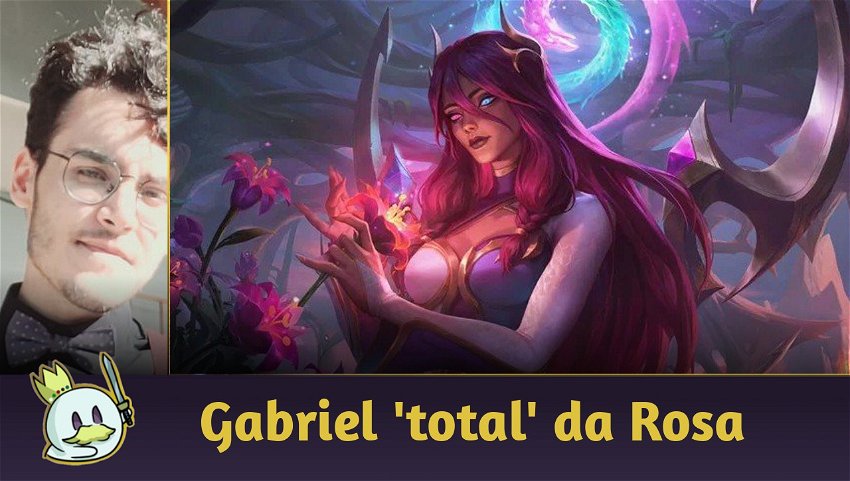








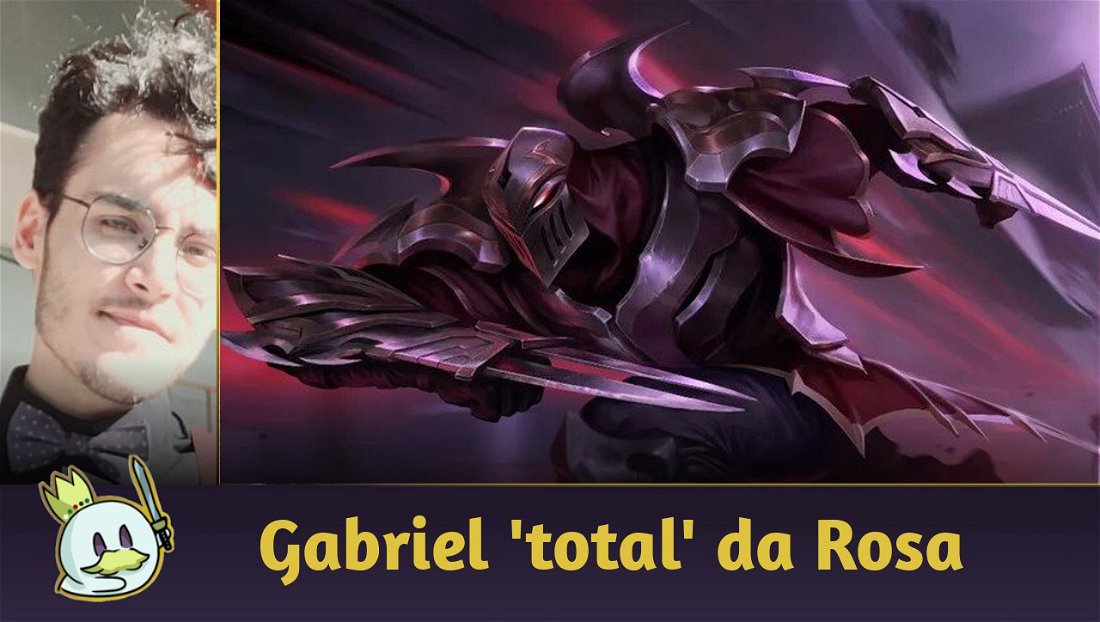
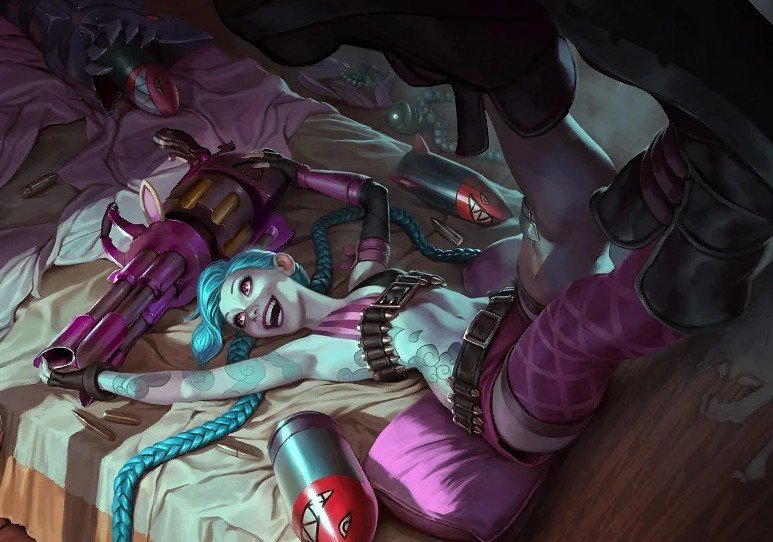



— コメント 0
, 反応 1
最初にコメントする